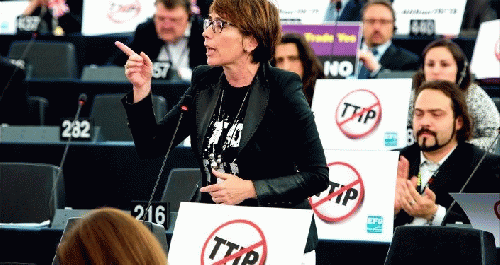The key to TTIP is the so-called Investor-State Dispute Settlement mechanism that essentially gives corporations free reign to sue governments using a "failure to implement" provision, if state policies or legislation interfere with profits. But is this all about trade?There was a direct, crucial "secret" agenda linking the G7 meeting in Germany and the Bilderberg meeting in Austria last week; the advancement of the virtually secret negotiations towards the Transatlantic Trade and Investment Partnership (TTIP), the massive free trade agreement between the US and the EU.
Even though the corporate powers behind TTIP are itching for a deal to be reached before the end of 2015, serious (negotiation) trouble remains.
And then there was last Friday's vote in the US Congress. What happened were in fact two votes; one on giving the US government the "fast track" authority to conclude trade deals, mostly, in this case, the Trans-Pacific Partnership (TPP); and another one on help for US workers struggling to compete with imports as a result of trade deals.
"Fast track" passed, but not the adjustment assistance. So the US Senate will need to review "fast track." The corporate powers behind TPP -- and TTIP for that matter -- were not amused.
Yet the whole thing goes way beyond total presidential authority to negotiate shady deals such as the TTIP, the TPP and the Trade in Services Agreement (TiSA).
The Obama administration is obsessed with plugging a torrent of benefits for US workers once a Pacific deal is clinched. That's eminently debatable.
From the point of view of other nations, TPP is hardly a panacea. Washington offers no new, improved market access. TPP shuts out China completely -- which is ridiculous; Beijing is the top trading partner of most of these nations. And the key to TPP is corporations laying down the law on intellectual property rights -- which opens the door to all sorts of social Darwinist abuses.
The key to TTIP is the so-called Investor-State Dispute Settlements (ISDS); that essentially gives corporations free reign to sue governments, any government, using a "failure to implement" provision, if state policies or legislation interfere with profits. In sum: corporate ethos wins; workers, small and medium enterprises (SMEs), and democracy, lose badly.
One can already foresee the proliferation of kangaroo courts labeled "arbitration tribunals" stuffed with pricey corporate lawyers. So much for social "justice."
But is this all about trade? Of course not.
Welcome to NATO on trade
The giveaway is how the Obama administration is desperate to wrestle down Japanese resistance -- going on two solid years now -- against many of TPP's provisions. The proverbial "US officials" have been frantically spinning that TPP is crucial for the US "pivot to Asia."
Even Pentagon supremo Ash Carter went overboard two months ago, saying that TPP was "as important to me as another aircraft carrier."
The heart of the matter is these three mega-deals -- TTP, TTIP and TiSA -- are the ultimate template of a Bilderberg group wet dream: global corporate "governance."
And the Pentagon's own giveaway that TPP is the "strategic" economic arm of the "pivot to Asia" reveals how politicized "trade" has become. Under TPP, Chinese companies will have tremendous handicaps competing with US companies in both US and Asian markets. Call it yet another facet of "containment."
TTIP, TTP and TiSA are in fact a Hydra-like head; they follow the same geostrategic logic of NATO on trade -- transatlantic and trans-Pacific; the "West against the Rest." Not accidentally, the BRICS are excluded. And no wonder the negotiations are secret; global corporate "governance" is not exactly a pop hit in any latitude.






